外研版英语八年级升九年级暑假 第7讲 情态动词课件(48张无素材)
文档属性
| 名称 | 外研版英语八年级升九年级暑假 第7讲 情态动词课件(48张无素材) |

|
|
| 格式 | zip | ||
| 文件大小 | 12.3MB | ||
| 资源类型 | 教案 | ||
| 版本资源 | 外研版 | ||
| 科目 | 英语 | ||
| 更新时间 | 2020-06-11 23:59:45 | ||
图片预览




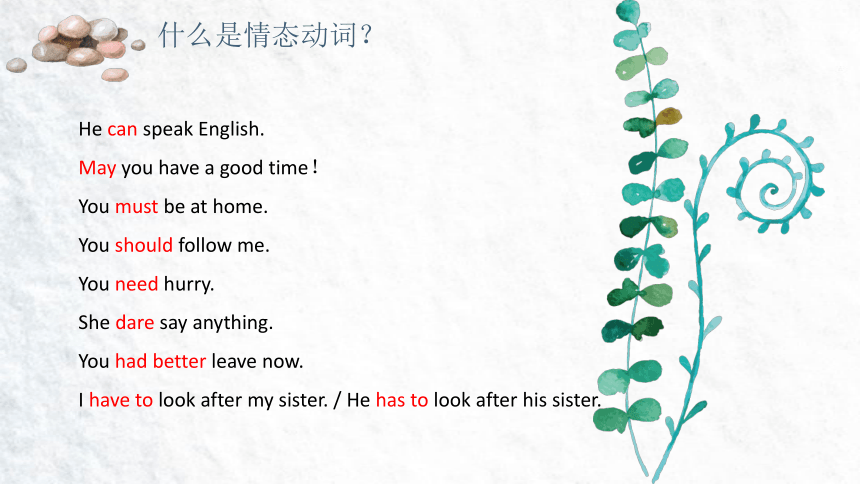
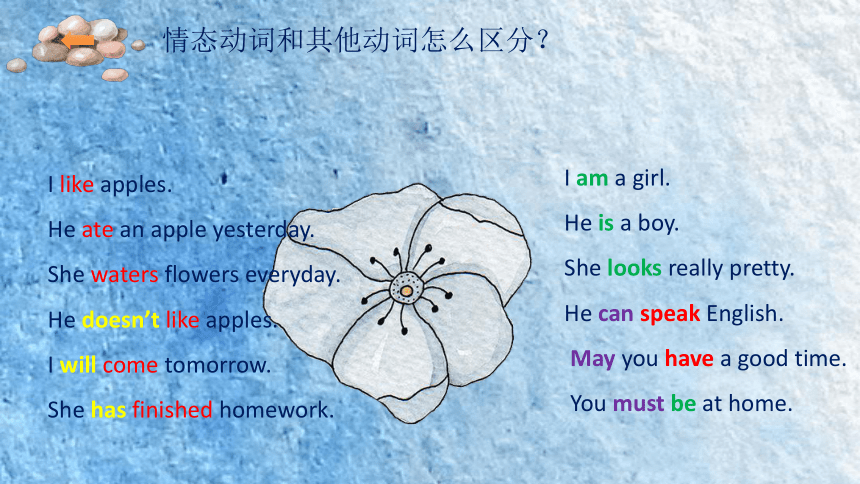

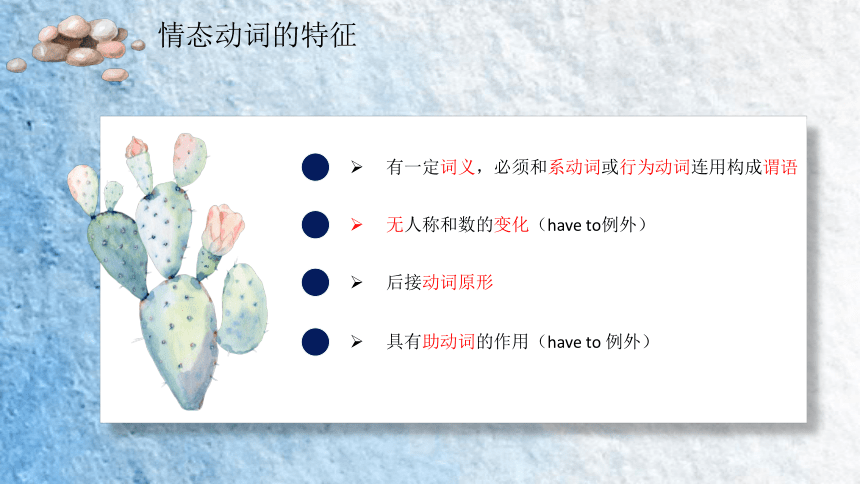
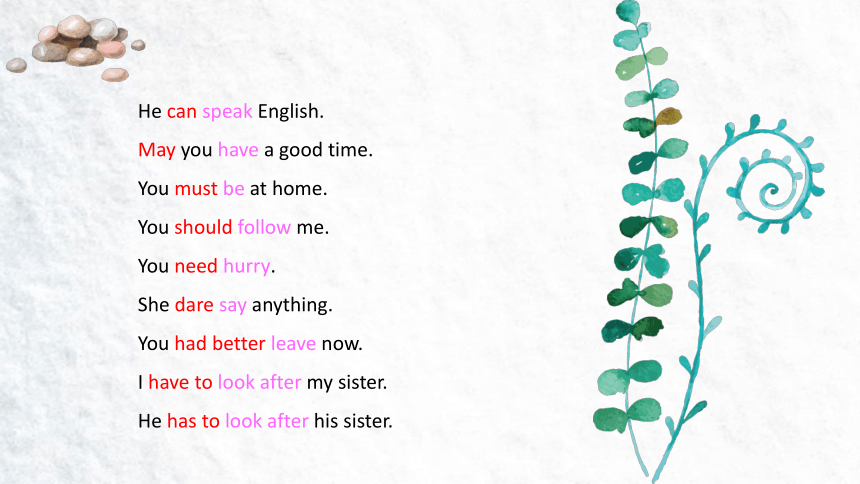
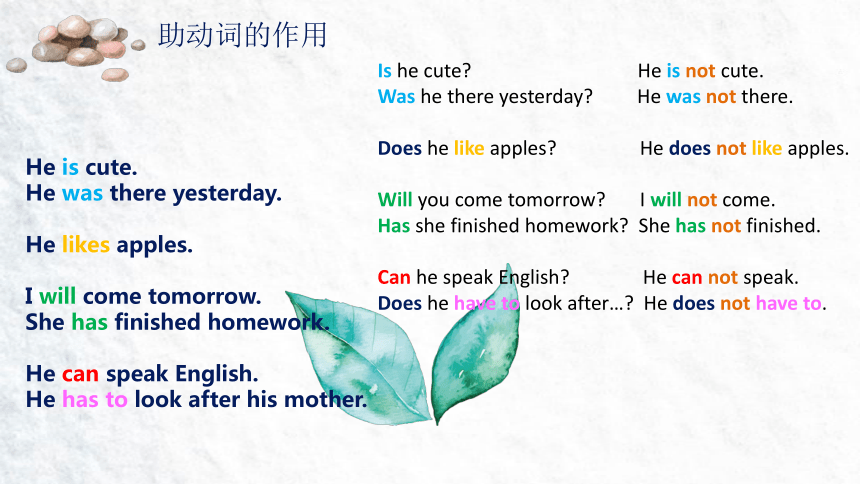
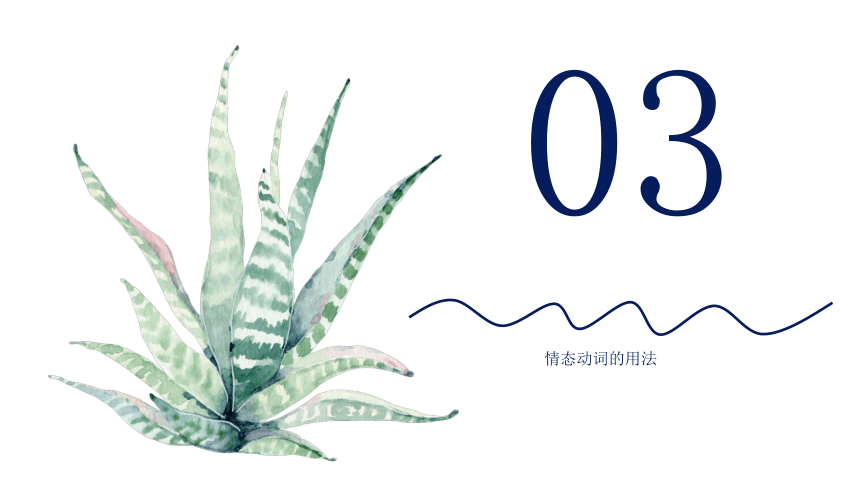
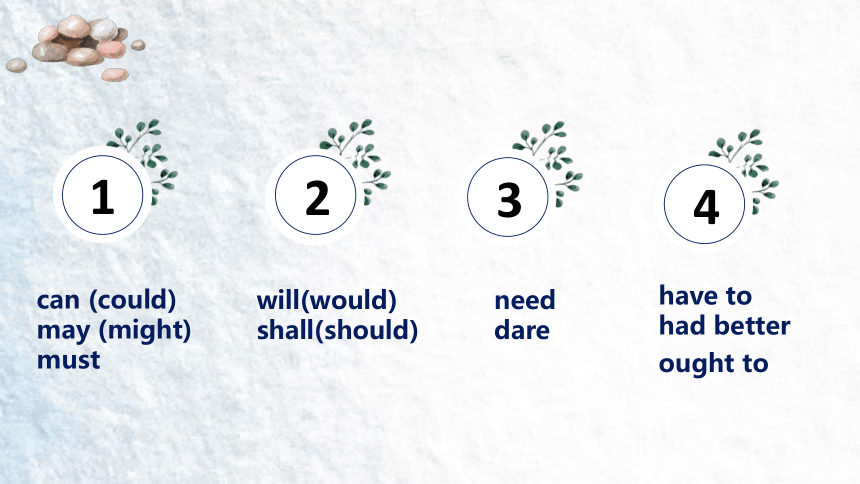
文档简介
(共48张PPT)
情态动词
Modal
verbs
新初三暑假课第7讲
目录
01
课前导入
02
特征
03
沙场总练兵
04
用法
01
课前导入
Lead-in
课前导入
什么是情态动词?
情态动词和其他动词怎么区分?
什么是情态动词?
He
can
speak
English.
May
you
have
a
good
time!
You
must
be
at
home.
You
should
follow
me.
You
need
hurry.
She
dare
say
anything.
You
had
better
leave
now.
I
have
to
look
after
my
sister.
/
He
has
to
look
after
his
sister.
I
am
a
girl.
He
is
a
boy.
She
looks
really
pretty.
He
can
speak
English.
May
you
have
a
good
time.
You
must
be
at
home.
I
like
apples.
He
ate
an
apple
yesterday.
She
waters
flowers
everyday.
He
doesn’t
like
apples.
I
will
come
tomorrow.
She
has
finished
homework.
情态动词和其他动词怎么区分?
02
情态动词的特征
情态动词的特征
有一定词义,必须和系动词或行为动词连用构成谓语
无人称和数的变化(have
to例外)
后接动词原形
具有助动词的作用(have
to
例外)
He
can
speak
English.
May
you
have
a
good
time.
You
must
be
at
home.
You
should
follow
me.
You
need
hurry.
She
dare
say
anything.
You
had
better
leave
now.
I
have
to
look
after
my
sister.
He
has
to
look
after
his
sister.
助动词的作用
He
is
cute.
He
was
there
yesterday.
He
likes
apples.
I
will
come
tomorrow.
She
has
finished
homework.
He
can
speak
English.
He
has
to
look
after
his
mother.
Is
he
cute?
He
is
not
cute.
Was
he
there
yesterday?
He
was
not
there.
Does
he
like
apples?
He
does
not
like
apples.
Will
you
come
tomorrow?
I
will
not
come.
Has
she
finished
homework?
She
has
not
finished.
Can
he
speak
English?
He
can
not
speak.
Does
he
have
to
look
after…?
He
does
not
have
to.
03
情态动词的用法
1
can
(could)
may
(might)
must
2
will(would)
shall(should)
3
need
dare
4
have
to
had
better
ought
to
He
can
speak
English.
Some
of
us
can
use
the
computer
now.
The
baby
could
walk
in
a
few
weeks.
Can
I
use
your
pen?
Could
I
come
here
tomorrow?
You
can
park
your
car
here.
Anyone
can
make
mistakes.
Children
can
be
noisy
sometimes.
It
can
be
very
hot
in
our
city
in
summer.
表示能力
表示可能性
表示请求和许可
2.表示过去通过努力终于做成了某事要用be
able
to,而不能用can。如:
I
was
able
to
swim
to
the
bank
after
making
great
efforts.
can只有两种时态,can和could;
be
able
to
有多种时态,如was/were
able
to,
will/shall
be
able
to,
have/has
been
able
to
can/could
与
be
able
to
的区别
can/
could
1,表示能力(could表示过去的能力)
与be
able
to区别:can表示泛指的能力,只有两种时态
2,
表示可能性(could可能性更小)
3,表示请求和许可(could更委婉)
He
may
know
my
secret.
She
may
know
my
phone
number.
He
might
come
tomorrow,
but
I’m
not
quite
sure.
May
you
succeed!
May
you
have
a
good
time!
May
you
live
a
happy
life!
You
may
come
if
you
wish.
May
I
use
your
pen?
You
may
open
the
door.
表示可能性
表示请求和许可
表示祝愿
may/
might
1,表示可能性(might可能性更小)
2,
表示请求和许可(
might更委婉)
3,表示祝愿
You
must
go
home.
Must
we
work
on
Sunday?
The
light
is
on,
so
he
must
be
at
home.
Look
at
his
new
car.
He
must
have
earned
a
lot
of
money.
If
you
must
smoke,
please
go
outside.
Why
must
it
rain
on
Sunday?
表示必须
表示推测:肯定
表示非得
must
1,表示必须
2,
表示推测:肯定
3,表示非得
Shall
we
meet
at
6
o’clock?
I
asked
the
manager
if
I
should
have
a
few
days
off.
Those
members
of
our
club
shall
wear
uniforms.
You
should
follow
me.
Why
should
he
tell
a
lie?
表示征求意见
表示应该
表示竟然
shall
/
should
1,表示征求意见
用于一、三人称
2,
表示应该
shall
用于法律条文
3,表示竟然
Will
you
come
tomorrow?
Would
you
open
the
window,
please?
I
will
try
my
best
to
help
you.
She
said
she
would
try
her
best
to
help
me.
表示征求意见
表示意愿
will
/
would
1,表示征求意见
would
更委婉
2,
表示意愿
You
need
hurry.
She
need
drink
water
right
now.
She
dare
say
anything
about
it.
How
dare
you
speak
to
me
in
this
way?!
表示需要
表示敢
You
need
hurry.
She
need
drink
water
right
now.
You
need
to
hurry
She
needs
to
drink
water
right
now.
I
need
you.
She
needs
water.
实义动词need用法:
need
+
to
do
need
+
sb.
/
sth.
情态动词need用法:
need
+
do
You?______?get?there?by?bus.???
A.?don’t?need??
B.?needn’t?to??
C.?don’t?need?to??
D.?need?don’t?to
need
和
dare
1,need表示需要
2,
dare表示敢
have
to
表示
不得不
had
better
表示
最好(had
better可缩写为’d
better)
ought
to
表示
应该
(比should语气强烈)
I
have
to
look
after
my
mom
now.
He
has
to
look
after
his
mom
tomorrow.
He
had
to
look
after
his
mom
yesterday.
You
had
better(You’d
better)
leave
now.
You
ought
to
finish
your
homework
on
time!
情态动词
否定式
缩略形式
can
/
could
can
not
/
could
not
can’t
/
couldn’t
may
/
might
may
not
/
might
not
mayn’t
/
mightn’t
must
must
not
mustn
’t
shall
/
should
shall
not
/
should
not
shan’t
/
shouldn’t
will
/
would
will
not
/
would
not
won’t
/
wouldn’t
need
need
not
needn’t
dare
dare
not
daren’t
have
to
don’t
have
to或doesn’t
have
to
had
better
had
better
not
‘d
better
not
ought
to
ought
not
to
oughtn’t
情态动词的否定
情态动词有一定的含义,但不能单独使用,需与动词原形连用构成谓语。情态动词没有人称和数的变化,其否定形式一般是在情态动词后加not(have
to
除外),其疑问形式是将情态动词提至主语前。
添加
关键字
添加
关键字
添加
关键字
添加
关键字
情态动词
分类
用法
例句
can
与be
able
to
(1)两者都表示能力,意为“能够;可以”。be
able
to可用于任何时态,can只能用于一般现在时和一般过去时。
(2)can和could(can的过去式)还可以表示请求和许可。
(3)can’t
一般用于否定推测。
(1)They
will
be
able
to
tell
you
the
news
soon.
(2)—Could
I
have
the
television
on?
—Yes,
you
can./No,
you
can’t.
(3)That
can't
be
Mr
Wang.
He
has
gone
to
Beijing.
may
与might
(1)两者都表示“可能,请求,许可”,might的语气较为委婉。
(2)以may开头的一般疑问句的否定回答不用may
not,而是用mustn’t或can’t。
(3)
might(may的过去式)有两种用法:①表示过去式;②表示委婉语气,或表示可能性更小。
(1)—May
I
use
your
pen?
—Yes,
you
may./No,
you
mustn’t/can’t.
(2)Might
I
borrow
some
money
now?
(3)He
might
be
alive.
need
(1)need作情态动词时,表示“需要”。主要用于否定句和疑问句中,其否定形式为
needn’t,表示“没有必要,不必”;对need构成的一般疑问句进行回答时,其肯定回答用
“Yes,…must.”,
否定回答用“No,
…needn't.”。
(2)need
还可以用作实义动词,常用于以下两种结构:①need
to
do
sth
需要做某事;
②need
sth/
sb.
(1)She
needn't
go
there
right
now.
(2)—Need
I
come?
—Yes,
you
must.
(3)I
need
to
learn
more.
(4)She
needs
water.
[归纳]情态动词表推测的用法:
(1)在肯定句中一般用must(一定),may/might(可能),could(也许;或许),其中must表推测的语气最强,其余依次减弱。
(2)在否定句中一般用can't/couldn't(不可能)。
(3)在疑问句中用can/could(能)。如:
—Can
the
red
sweater
be
Tom’s?
—No,
it
can't.He
can't
stand
red.
情态动词的回答
1.
-Can
you
go
swimming
with
us
this
afternoon?
-Sorry.
I
can't.
I______
take
care
of
my
little
sister
at
home
because
my
mother
is
ill
A.
can
B.
may
C.
would
D.
have
to
2.
---May
I
borrow
this
book?
No.
you
______.
A.
may
not
B.
can’t
C.
needn’t
D.
don't
have
to
3..
-Must
we
handle
in
the
homework
now?
---No,
you______.
A.
can't
B.
may
not
C.
mustn’t
D.
needn’t
4.
--Could
I
use
your
computer?
My
computer
broke
down
just
now.
--Yes,
of
course
you_______.
A.
might
B.
will
C.
can
D.
should
5.______
I
smoke
in
the
room??
-I’m
afraid
not.
A.
Need
B.
May
C.
Should
D.
Must
04
沙场总练兵
基础题
1.
Mr.
Wang
______
be
in
Nanjing
now,
he
went
to
Beijing
only
this
morning.
A.
mustn’t
B.
may
not ?
C.
can’t ?
D.
needn’t
2.
–Must
I
stay
at
home,
Mum? ?
--No,
you
______.
A.
needn’t
B.
mustn’t ?
C.
don’t ?
D.
may
not
3.
–Can
you
go
swimming
with
us
this
afternoon?
--Sorry,
I
can’t.
I
_____
take
care
of
my
little
sister
at
home
because
my
mother
is
ill.
A.
can
B.
may
C.
would
D.
have
to
4.
–May
I
go
to
the
cinema,
Mum??
--Certainly.
But
you
______
be
back
by
11
o’clock.
A.
can ?
B.
may
C.
must ?
D.
need
5.
To
make
our
city
more
beautiful,
rubbish
______
into
the
river.
A.
needn’t
be
thrown
B.
mustn’t
be
thrown
C.
can’t
throw ?
D.
may
not
throw
6.
–May
I
go
out
to
play
basketball,
Dad????
--No,
you
______.
You
must
finish
your
homework
first.
A.
mustn’t
B.
may
not
C.
couldn’t ?
D.
needn’t
7.
–Where
is
Jack,
please
?
--He
_____
be
in
the
reading
room.
A.
can
B.
need ?
C.
would ?
D.
must
8.
–Who
is
the
man
over
there?
Is
it
Mr
Li?
--No,
it
______
be
him.
Mr
Li
is
much
taller.
A.
musn’t
B.
may
not
C.
can’t
D.
needn’t
9.
These
books
______
out
of
the
reading
room.
You
have
to
read
them
here.
A.
can’t
take ?
B.
must
be
taken ?
C.
can
take D.
mustn’t
be
taken
10.
–Mum,
may
I
watch
TV
now? ?
--Sure,
but
you
______
help
me
with
my
housework
first.
A.
can ?
B.
may
C.
must
D.
could
11.
The
boy
said
he
had
to
speak
English
in
class,
but
he
______
speak
it
after
calss.
A.
could ?
B.
didn’t
have
to ?
C.
might ?
D.
shouldn’t
12.
–Must
we
hand
in
the
papers
now?
--No,
you
______.
A.
can’t ?
B.
may
not
C.
mustn’t ?
D.
needn’t
13.
John
______
go
there
with
us
tonight,
but
he
isn’t
very
sure
about
it.
A.
must ?
B.
can
C.
will ?
D.
may
14.
Even
the
top
students
in
our
class
can’t
work
out
this
problem.
So
it
______
be
very
difficult.
A.
can
B.
may
C.
must ?
D.
need
15.
Put
on
more
clothes.
You
______
be
feeling
cold
with
only
a
shirt
on.
A.
can
B.
could ?
C.
would
D.
must
16.
It’s
still
early.
You
______.
A.
mustn’t
hurry ?
B.
wouldn’t
hurry
C.
may
not
hurry
D.
don’t
have
to
hurry
17.
–May
I
stop
here?
--No,
you
______.
A.
mustn’t
B.
might
not C.
needn’t D.
won’t
18.
A
computer
______
think
for
itself,
it
must
be
told
what
to
do.
A.
can’t ??
B.
couldn’t C.
may
not
D.
might
not
19.
–Could
I
borrow
your
dictionary?
--
Yes,
of
course
you
_______.
A.
might ?
B.
will ?
C.
can
D.
should
20.
Peter
______
come
with
us
tonight,
but
he
isn’t
very
sure
yet.
A.
must
B.
may
C.
can
D.
will
21.
Michael
______
be
a
policeman,
for
he’s
much
too
short.
A.
needn’t
B.
can’t
C.
should D.
may
22.
______
I
know
your
name?
A.
May
B.
Will ?
C.
Shall
D.
Must
23.
You
______
be
more
careful
next
time.
A.
have
to
B.
may ?
C.
must
D.
might
24.
You
______
miss
the
lesson,
though
we
______
have
it
on
Thursday.
A.
mustn’t;
needn’t?
B.
needn’t;
mustn’t?
C.
mustn’t;
mustn’t?
D.
needn’t;
needn’t
25.
This
pen
looks
like
mine,
yet
it
isn’t.
whose
______
it
be?
A.
must
B.
may ?
C.
would
D.
can
26.
What
kinds
of
homes
will
we
live
in
the
future?
Nobody
______
be
sure,
but
scientists
are
working
out
new
ideas
now.
A.
will ?
B.
may ?
C.
can
D.
must
27.
I
______
like
to
know
where
you
were
born.
A.
shall
B.
would ?
C.
do ?
D.
may
28.
______
you
be
happy!
A.
Might ?
B.
Must
C.
Wish ?
D.
May
29.
A
teacher
______
do
every
exercise,
but
a
student
must.
A.
may
not B.
needn’t
C.
can’t ?
D.
mustn’t
30.
The
matter
______
be
changed
into
a
gas,
but
it
_______
be
heated
to
its
boiling
point.
A.
may;
needn’t B.
may;
can
C.
mustn’t;
needn’t??
D.
can;
must
31.
Teachers
and
students
______
look
coldly
at
you
for
a
day
or
two,
but
there
are
friendly
feelings
in
their
hearts.
A.
must
B.
can ?
C.
may
D.
should
32.
Cars
and
buses
______
stop
when
the
traffic
lights
turn
red.
A.
can ?
B.
need
C.
may
D.
must
33.
–Do
you
think
his
story
______
true?
--I
don’
think
so.
But
it
sounds
good.
A.
must
be
B.
may
be
C.
can
be
D.
has
to
be
34.
Look
out!
The
knife
is
very
sharp.
You
______
cut
your
finger.
A.
need
B.
must
C.
should
D.
may
35.
–How
long
______
the
book
be
kept? ?
--For
two
weeks,
but
you
______
return
it
on
time.
A.
can;
may
B.
may;
need
C.
can;
must D.
must;
need
36.
–
May
I
have
an
apple,
Mum? ?
--Certainly.
But
you
______wash
your
hands
first.
A.
may
B.
must ?
C.
can
D.
need
37.
–There
is
a
lot
of
smoke
coming
out
of
the
teaching
building
there.
--Really?
It
______
be
a
fire,
most
probably.
A.
can
B.
ought
to
C.
may ?
D.
must
38.
–Could
I
call
you
by
your
first
name?
--Yes,
you
______.
A.
will
B.
could
C.
may ?
D.
might
41.
--______
the
man
there
be
our
new
teacher?
--He
______
be,
but
I’m
not
sure.
A.
May;
mustn’t
B.
Can;
may
C.
Must;
can’t
D.
Can;
can’t
42.
–Someone
is
knocking
at
the
door.
Who
______
it
be?
--It
______
be
Tom.
He
is
still
in
the
school.
A.
can;
can’t B.
can;
mustn’t
C.
might;
could D.
might;
may
05
总结
Thank
you!
情态动词
Modal
verbs
新初三暑假课第7讲
目录
01
课前导入
02
特征
03
沙场总练兵
04
用法
01
课前导入
Lead-in
课前导入
什么是情态动词?
情态动词和其他动词怎么区分?
什么是情态动词?
He
can
speak
English.
May
you
have
a
good
time!
You
must
be
at
home.
You
should
follow
me.
You
need
hurry.
She
dare
say
anything.
You
had
better
leave
now.
I
have
to
look
after
my
sister.
/
He
has
to
look
after
his
sister.
I
am
a
girl.
He
is
a
boy.
She
looks
really
pretty.
He
can
speak
English.
May
you
have
a
good
time.
You
must
be
at
home.
I
like
apples.
He
ate
an
apple
yesterday.
She
waters
flowers
everyday.
He
doesn’t
like
apples.
I
will
come
tomorrow.
She
has
finished
homework.
情态动词和其他动词怎么区分?
02
情态动词的特征
情态动词的特征
有一定词义,必须和系动词或行为动词连用构成谓语
无人称和数的变化(have
to例外)
后接动词原形
具有助动词的作用(have
to
例外)
He
can
speak
English.
May
you
have
a
good
time.
You
must
be
at
home.
You
should
follow
me.
You
need
hurry.
She
dare
say
anything.
You
had
better
leave
now.
I
have
to
look
after
my
sister.
He
has
to
look
after
his
sister.
助动词的作用
He
is
cute.
He
was
there
yesterday.
He
likes
apples.
I
will
come
tomorrow.
She
has
finished
homework.
He
can
speak
English.
He
has
to
look
after
his
mother.
Is
he
cute?
He
is
not
cute.
Was
he
there
yesterday?
He
was
not
there.
Does
he
like
apples?
He
does
not
like
apples.
Will
you
come
tomorrow?
I
will
not
come.
Has
she
finished
homework?
She
has
not
finished.
Can
he
speak
English?
He
can
not
speak.
Does
he
have
to
look
after…?
He
does
not
have
to.
03
情态动词的用法
1
can
(could)
may
(might)
must
2
will(would)
shall(should)
3
need
dare
4
have
to
had
better
ought
to
He
can
speak
English.
Some
of
us
can
use
the
computer
now.
The
baby
could
walk
in
a
few
weeks.
Can
I
use
your
pen?
Could
I
come
here
tomorrow?
You
can
park
your
car
here.
Anyone
can
make
mistakes.
Children
can
be
noisy
sometimes.
It
can
be
very
hot
in
our
city
in
summer.
表示能力
表示可能性
表示请求和许可
2.表示过去通过努力终于做成了某事要用be
able
to,而不能用can。如:
I
was
able
to
swim
to
the
bank
after
making
great
efforts.
can只有两种时态,can和could;
be
able
to
有多种时态,如was/were
able
to,
will/shall
be
able
to,
have/has
been
able
to
can/could
与
be
able
to
的区别
can/
could
1,表示能力(could表示过去的能力)
与be
able
to区别:can表示泛指的能力,只有两种时态
2,
表示可能性(could可能性更小)
3,表示请求和许可(could更委婉)
He
may
know
my
secret.
She
may
know
my
phone
number.
He
might
come
tomorrow,
but
I’m
not
quite
sure.
May
you
succeed!
May
you
have
a
good
time!
May
you
live
a
happy
life!
You
may
come
if
you
wish.
May
I
use
your
pen?
You
may
open
the
door.
表示可能性
表示请求和许可
表示祝愿
may/
might
1,表示可能性(might可能性更小)
2,
表示请求和许可(
might更委婉)
3,表示祝愿
You
must
go
home.
Must
we
work
on
Sunday?
The
light
is
on,
so
he
must
be
at
home.
Look
at
his
new
car.
He
must
have
earned
a
lot
of
money.
If
you
must
smoke,
please
go
outside.
Why
must
it
rain
on
Sunday?
表示必须
表示推测:肯定
表示非得
must
1,表示必须
2,
表示推测:肯定
3,表示非得
Shall
we
meet
at
6
o’clock?
I
asked
the
manager
if
I
should
have
a
few
days
off.
Those
members
of
our
club
shall
wear
uniforms.
You
should
follow
me.
Why
should
he
tell
a
lie?
表示征求意见
表示应该
表示竟然
shall
/
should
1,表示征求意见
用于一、三人称
2,
表示应该
shall
用于法律条文
3,表示竟然
Will
you
come
tomorrow?
Would
you
open
the
window,
please?
I
will
try
my
best
to
help
you.
She
said
she
would
try
her
best
to
help
me.
表示征求意见
表示意愿
will
/
would
1,表示征求意见
would
更委婉
2,
表示意愿
You
need
hurry.
She
need
drink
water
right
now.
She
dare
say
anything
about
it.
How
dare
you
speak
to
me
in
this
way?!
表示需要
表示敢
You
need
hurry.
She
need
drink
water
right
now.
You
need
to
hurry
She
needs
to
drink
water
right
now.
I
need
you.
She
needs
water.
实义动词need用法:
need
+
to
do
need
+
sb.
/
sth.
情态动词need用法:
need
+
do
You?______?get?there?by?bus.???
A.?don’t?need??
B.?needn’t?to??
C.?don’t?need?to??
D.?need?don’t?to
need
和
dare
1,need表示需要
2,
dare表示敢
have
to
表示
不得不
had
better
表示
最好(had
better可缩写为’d
better)
ought
to
表示
应该
(比should语气强烈)
I
have
to
look
after
my
mom
now.
He
has
to
look
after
his
mom
tomorrow.
He
had
to
look
after
his
mom
yesterday.
You
had
better(You’d
better)
leave
now.
You
ought
to
finish
your
homework
on
time!
情态动词
否定式
缩略形式
can
/
could
can
not
/
could
not
can’t
/
couldn’t
may
/
might
may
not
/
might
not
mayn’t
/
mightn’t
must
must
not
mustn
’t
shall
/
should
shall
not
/
should
not
shan’t
/
shouldn’t
will
/
would
will
not
/
would
not
won’t
/
wouldn’t
need
need
not
needn’t
dare
dare
not
daren’t
have
to
don’t
have
to或doesn’t
have
to
had
better
had
better
not
‘d
better
not
ought
to
ought
not
to
oughtn’t
情态动词的否定
情态动词有一定的含义,但不能单独使用,需与动词原形连用构成谓语。情态动词没有人称和数的变化,其否定形式一般是在情态动词后加not(have
to
除外),其疑问形式是将情态动词提至主语前。
添加
关键字
添加
关键字
添加
关键字
添加
关键字
情态动词
分类
用法
例句
can
与be
able
to
(1)两者都表示能力,意为“能够;可以”。be
able
to可用于任何时态,can只能用于一般现在时和一般过去时。
(2)can和could(can的过去式)还可以表示请求和许可。
(3)can’t
一般用于否定推测。
(1)They
will
be
able
to
tell
you
the
news
soon.
(2)—Could
I
have
the
television
on?
—Yes,
you
can./No,
you
can’t.
(3)That
can't
be
Mr
Wang.
He
has
gone
to
Beijing.
may
与might
(1)两者都表示“可能,请求,许可”,might的语气较为委婉。
(2)以may开头的一般疑问句的否定回答不用may
not,而是用mustn’t或can’t。
(3)
might(may的过去式)有两种用法:①表示过去式;②表示委婉语气,或表示可能性更小。
(1)—May
I
use
your
pen?
—Yes,
you
may./No,
you
mustn’t/can’t.
(2)Might
I
borrow
some
money
now?
(3)He
might
be
alive.
need
(1)need作情态动词时,表示“需要”。主要用于否定句和疑问句中,其否定形式为
needn’t,表示“没有必要,不必”;对need构成的一般疑问句进行回答时,其肯定回答用
“Yes,…must.”,
否定回答用“No,
…needn't.”。
(2)need
还可以用作实义动词,常用于以下两种结构:①need
to
do
sth
需要做某事;
②need
sth/
sb.
(1)She
needn't
go
there
right
now.
(2)—Need
I
come?
—Yes,
you
must.
(3)I
need
to
learn
more.
(4)She
needs
water.
[归纳]情态动词表推测的用法:
(1)在肯定句中一般用must(一定),may/might(可能),could(也许;或许),其中must表推测的语气最强,其余依次减弱。
(2)在否定句中一般用can't/couldn't(不可能)。
(3)在疑问句中用can/could(能)。如:
—Can
the
red
sweater
be
Tom’s?
—No,
it
can't.He
can't
stand
red.
情态动词的回答
1.
-Can
you
go
swimming
with
us
this
afternoon?
-Sorry.
I
can't.
I______
take
care
of
my
little
sister
at
home
because
my
mother
is
ill
A.
can
B.
may
C.
would
D.
have
to
2.
---May
I
borrow
this
book?
No.
you
______.
A.
may
not
B.
can’t
C.
needn’t
D.
don't
have
to
3..
-Must
we
handle
in
the
homework
now?
---No,
you______.
A.
can't
B.
may
not
C.
mustn’t
D.
needn’t
4.
--Could
I
use
your
computer?
My
computer
broke
down
just
now.
--Yes,
of
course
you_______.
A.
might
B.
will
C.
can
D.
should
5.______
I
smoke
in
the
room??
-I’m
afraid
not.
A.
Need
B.
May
C.
Should
D.
Must
04
沙场总练兵
基础题
1.
Mr.
Wang
______
be
in
Nanjing
now,
he
went
to
Beijing
only
this
morning.
A.
mustn’t
B.
may
not ?
C.
can’t ?
D.
needn’t
2.
–Must
I
stay
at
home,
Mum? ?
--No,
you
______.
A.
needn’t
B.
mustn’t ?
C.
don’t ?
D.
may
not
3.
–Can
you
go
swimming
with
us
this
afternoon?
--Sorry,
I
can’t.
I
_____
take
care
of
my
little
sister
at
home
because
my
mother
is
ill.
A.
can
B.
may
C.
would
D.
have
to
4.
–May
I
go
to
the
cinema,
Mum??
--Certainly.
But
you
______
be
back
by
11
o’clock.
A.
can ?
B.
may
C.
must ?
D.
need
5.
To
make
our
city
more
beautiful,
rubbish
______
into
the
river.
A.
needn’t
be
thrown
B.
mustn’t
be
thrown
C.
can’t
throw ?
D.
may
not
throw
6.
–May
I
go
out
to
play
basketball,
Dad????
--No,
you
______.
You
must
finish
your
homework
first.
A.
mustn’t
B.
may
not
C.
couldn’t ?
D.
needn’t
7.
–Where
is
Jack,
please
?
--He
_____
be
in
the
reading
room.
A.
can
B.
need ?
C.
would ?
D.
must
8.
–Who
is
the
man
over
there?
Is
it
Mr
Li?
--No,
it
______
be
him.
Mr
Li
is
much
taller.
A.
musn’t
B.
may
not
C.
can’t
D.
needn’t
9.
These
books
______
out
of
the
reading
room.
You
have
to
read
them
here.
A.
can’t
take ?
B.
must
be
taken ?
C.
can
take D.
mustn’t
be
taken
10.
–Mum,
may
I
watch
TV
now? ?
--Sure,
but
you
______
help
me
with
my
housework
first.
A.
can ?
B.
may
C.
must
D.
could
11.
The
boy
said
he
had
to
speak
English
in
class,
but
he
______
speak
it
after
calss.
A.
could ?
B.
didn’t
have
to ?
C.
might ?
D.
shouldn’t
12.
–Must
we
hand
in
the
papers
now?
--No,
you
______.
A.
can’t ?
B.
may
not
C.
mustn’t ?
D.
needn’t
13.
John
______
go
there
with
us
tonight,
but
he
isn’t
very
sure
about
it.
A.
must ?
B.
can
C.
will ?
D.
may
14.
Even
the
top
students
in
our
class
can’t
work
out
this
problem.
So
it
______
be
very
difficult.
A.
can
B.
may
C.
must ?
D.
need
15.
Put
on
more
clothes.
You
______
be
feeling
cold
with
only
a
shirt
on.
A.
can
B.
could ?
C.
would
D.
must
16.
It’s
still
early.
You
______.
A.
mustn’t
hurry ?
B.
wouldn’t
hurry
C.
may
not
hurry
D.
don’t
have
to
hurry
17.
–May
I
stop
here?
--No,
you
______.
A.
mustn’t
B.
might
not C.
needn’t D.
won’t
18.
A
computer
______
think
for
itself,
it
must
be
told
what
to
do.
A.
can’t ??
B.
couldn’t C.
may
not
D.
might
not
19.
–Could
I
borrow
your
dictionary?
--
Yes,
of
course
you
_______.
A.
might ?
B.
will ?
C.
can
D.
should
20.
Peter
______
come
with
us
tonight,
but
he
isn’t
very
sure
yet.
A.
must
B.
may
C.
can
D.
will
21.
Michael
______
be
a
policeman,
for
he’s
much
too
short.
A.
needn’t
B.
can’t
C.
should D.
may
22.
______
I
know
your
name?
A.
May
B.
Will ?
C.
Shall
D.
Must
23.
You
______
be
more
careful
next
time.
A.
have
to
B.
may ?
C.
must
D.
might
24.
You
______
miss
the
lesson,
though
we
______
have
it
on
Thursday.
A.
mustn’t;
needn’t?
B.
needn’t;
mustn’t?
C.
mustn’t;
mustn’t?
D.
needn’t;
needn’t
25.
This
pen
looks
like
mine,
yet
it
isn’t.
whose
______
it
be?
A.
must
B.
may ?
C.
would
D.
can
26.
What
kinds
of
homes
will
we
live
in
the
future?
Nobody
______
be
sure,
but
scientists
are
working
out
new
ideas
now.
A.
will ?
B.
may ?
C.
can
D.
must
27.
I
______
like
to
know
where
you
were
born.
A.
shall
B.
would ?
C.
do ?
D.
may
28.
______
you
be
happy!
A.
Might ?
B.
Must
C.
Wish ?
D.
May
29.
A
teacher
______
do
every
exercise,
but
a
student
must.
A.
may
not B.
needn’t
C.
can’t ?
D.
mustn’t
30.
The
matter
______
be
changed
into
a
gas,
but
it
_______
be
heated
to
its
boiling
point.
A.
may;
needn’t B.
may;
can
C.
mustn’t;
needn’t??
D.
can;
must
31.
Teachers
and
students
______
look
coldly
at
you
for
a
day
or
two,
but
there
are
friendly
feelings
in
their
hearts.
A.
must
B.
can ?
C.
may
D.
should
32.
Cars
and
buses
______
stop
when
the
traffic
lights
turn
red.
A.
can ?
B.
need
C.
may
D.
must
33.
–Do
you
think
his
story
______
true?
--I
don’
think
so.
But
it
sounds
good.
A.
must
be
B.
may
be
C.
can
be
D.
has
to
be
34.
Look
out!
The
knife
is
very
sharp.
You
______
cut
your
finger.
A.
need
B.
must
C.
should
D.
may
35.
–How
long
______
the
book
be
kept? ?
--For
two
weeks,
but
you
______
return
it
on
time.
A.
can;
may
B.
may;
need
C.
can;
must D.
must;
need
36.
–
May
I
have
an
apple,
Mum? ?
--Certainly.
But
you
______wash
your
hands
first.
A.
may
B.
must ?
C.
can
D.
need
37.
–There
is
a
lot
of
smoke
coming
out
of
the
teaching
building
there.
--Really?
It
______
be
a
fire,
most
probably.
A.
can
B.
ought
to
C.
may ?
D.
must
38.
–Could
I
call
you
by
your
first
name?
--Yes,
you
______.
A.
will
B.
could
C.
may ?
D.
might
41.
--______
the
man
there
be
our
new
teacher?
--He
______
be,
but
I’m
not
sure.
A.
May;
mustn’t
B.
Can;
may
C.
Must;
can’t
D.
Can;
can’t
42.
–Someone
is
knocking
at
the
door.
Who
______
it
be?
--It
______
be
Tom.
He
is
still
in
the
school.
A.
can;
can’t B.
can;
mustn’t
C.
might;
could D.
might;
may
05
总结
Thank
you!
同课章节目录
- Module 1 Feelings and impressions
- Unit 1 It smells delicious.
- Unit 2 I feel nervous when I speak Chinese .
- Unit 3 Language in use
- Module 2 Experiences
- Unit 1 I've also entered lots of speaking competi
- Unit 2 They have seen the Pyramids.
- Unit 3 Language in use
- Module 3 Journey to space
- Unit 1 Has it arrived yet?
- Unit 2 We have not found life on any other planet
- Unit 3 Language in use
- Module 4 Seeing the docto
- Unit 1 I haven't done much exercise since I got m
- Unit 2 We have played football for a year now
- Unit 3 Language in use
- Module 5 Cartoons
- Unit 1 It's time to watch a cartoon.
- Unit 2 Tintin has been popular for over eighty yea
- Unit 3 Language in use
- Revision module A
- Module 6 Hobbies
- Unit 1 Do you collect anything ?
- Unit 2 Hobbies can make you grow as a person.
- Unit 3 Language in use
- Module 7 Summer in Los Angeles
- Unit 1 Please write to me and send me some photos
- Unit 2 Fill out a form and come to learn English
- Unit 3 Language in use
- Module 8 Time off
- Unit 1 I can hardly believe we are in the city ce
- Unit 2 We thought somebody was moving about
- Unit 3 Language in use
- Module 9 Friendship
- Unit 1 Could I ask if you've mentioned this to he
- Unit 2 I believe that the world is what you think
- Unit 3 Language in use
- Module 10 On the radio
- Unit 1 I hope that you can join us one day
- Unit 2 It seemed that they were speaking to me in
- Unit 3 Language in use
- Revision module B
